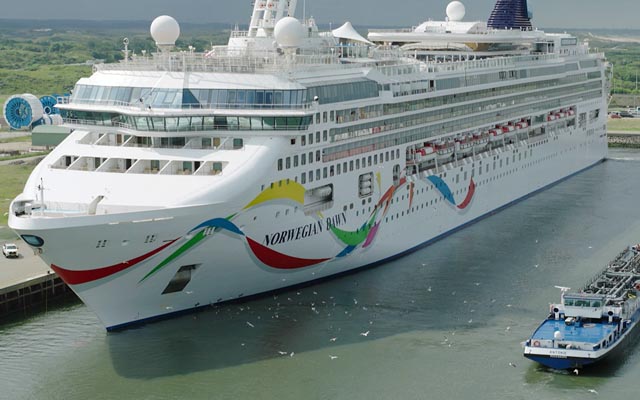While docked at the IJmuiden Cruise Terminal in the Netherlands, Norwegian Cruise Line’s ‘Norwegian Dawn’ received a GoodFuels B30 sustainable biofuel blend.
Supplied by FincoEnergies in partnership with KPI OceanConnect, this biofuel adoption is seen as an important step toward decarbonising the cruise line’s operations. The B30 biofuel blend, produced exclusively from feedstocks certified as 100% waste and residues, offers a sustainable alternative that avoids competition with food resources. By choosing GoodFuels’ sustainable biofuel, Norwegian Dawn can achieve up to 80-90% reduction in lifecycle CO₂ emissions compared to traditional marine diesel—requiring no engine modifications.
Beyond reducing carbon emissions, biofuels contribute to cleaner air quality along cruise routes. For vessels like Norwegian Dawn, this means fewer local pollutants such as sulfur oxides (SOx), particulate matter (PM), and black carbon, ultimately benefiting both the environment and communities near these waters.
Mayu Kubo, Commercial Manager Marine Biofuels, FincoEnergies said: “We’re excited to support Norwegian Cruise Line Holdings in their move toward cleaner cruising. By choosing sustainable biofuels, they’re driving down emissions and setting a strong example for the cruise industry.”
This initiative aligns with Norwegian Cruise Line Holdings’ ‘Sail and Sustain’ programme, which advocates for the use of renewable fuels across 40% of its fleet. For GoodFuels, each biofuel delivery is considered to reaffirm a commitment to making impact with maritime partners with practical, available and affordable decarbonisation solutions. The partnership with KPI OceanConnect on this project reflects a shared vision of sustainable biofuels as a viable path to reducing emissions in marine travel. As more cruise operators turn to sustainable fuels, GoodFuels is committed to backing this shift—helping pave the way for cleaner cruising and healthier marine environments.
Sustainable biofuels are regarded as an effective solution for decarbonising global shipping as they can be dropped into existing marine engines without having to make changes to the engine or fuel infrastructure. This means shipowners can start reducing CO2 emissions without having to invest heavily in new vessels or in retrofitting the current fleet.
Image: ‘Norwegian Dawn’ in IJmuiden (source: GoodFuels)



